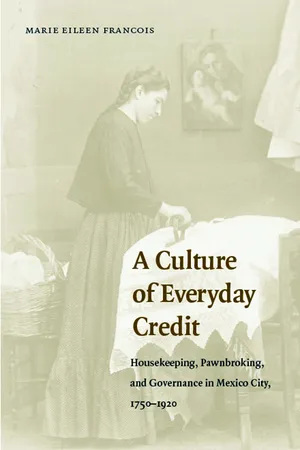
A Culture of Everyday Credit
Housekeeping, Pawnbroking, and Governance in Mexico City, 1750-1920
- 416 pages
- English
- PDF
- Only available on web
A Culture of Everyday Credit
Housekeeping, Pawnbroking, and Governance in Mexico City, 1750-1920
About This Book
Pawning was the most common credit mechanism in Mexico City in the nineteenth century. A diverse, largely female pawning clientele from lower- and middle-class households regularly secured small consumption loans by hocking household goods. A two-tiered sector of public and private pawnbrokers provided collateral credit. Rather than just providing emergency subsistence for the poor, pawnbroking facilitated consumption by Creole and mestizo middle sectors of Mexican society and enhanced identity formation for those in middling households by allowing them to cash in on material investments to maintain status during lean times. A Culture of Everyday Credit shows how Mexican women have depended on credit to run their households since the Bourbon era and how the collateral credit business of pawnbroking developed into a profitable enterprise built on the demand for housekeeping loans as restrictions on usury waned during the nineteenth century.
Pairing the study of household consumption with a detailed analysis of the rise of private and public pawnbroking provides an original context for understanding the role of small business in everyday life. Marie Eileen Francois weighs colonial reforms, liberal legislation, and social revolution in terms of their impact on households and pawning businesses.
Based on evidence from pawnshop inventories, censuses, legislation, petitions, literature, and newspapers, A Culture of Everyday Credit portrays households, small businesses, and government entities as intersecting arenas in one material world, a world strapped for cash throughout most of the century and turned upside down during the Mexican Revolution.
Frequently asked questions
Information
Table of contents
- Contents
- Illustrations
- Tables
- Acknowledgments
- Abbreviations
- Introduction
- 1. Hocking the Private in Public: Credit Policy, Housekeeping, and Status, 1750-1840
- 2. Collateral Lending: Pulperias and the Monte de Piedad, 1750-1840
- 3. Collateral Living: Consumption, Anxious Liberals, and Daily Life, 1830-80
- 4. Brokering Interests: Casas de Empeno and an Expanded Monte de Piedad, 1830-75
- 5. Positivist Housekeeping: Domesticity, Work, and Consumer Credit, 1880-1910
- 6. Porfirian Paradoxes: Profit versus Regulation, Capital versus Welfare
- 7. A Material Revolution: Militancy, Policy, and Housekeeping, 1911-20
- Conclusion: Housekeeping, Pawnbroking, and Politics
- Epilogue: Still a Culture of Everyday Credit
- Appendix 1: Collateral Transactions Data
- Appendix 2: Pawnbroker Data
- Appendix 3: Census Data
- Notes
- Index